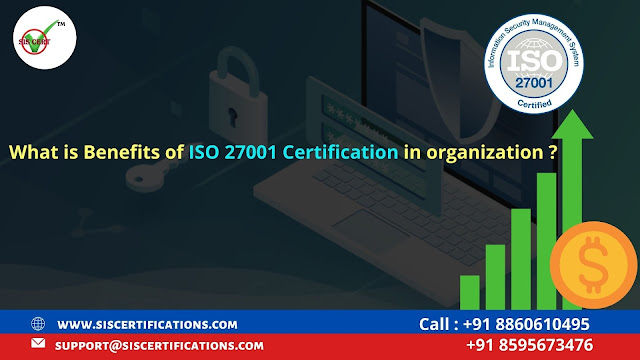What Are Benefits of ISO 27001 Certification in organization ?
ISO 27001 Certification is the global standard for Information Security Management System. The standard provides a common framework to ensure information security system. Irrespective of the size, this standard is pertinent for all kinds of organizations. Holistically managing the data security is the primary aim of ISO 27001 Certification. This standard incorporates a normative procedure to deal with constructing, actualizing, working, and continuously updating up your ISMS. ISO 27001Certification enables the organization to safeguard their information/data from:
·
Cyber
Crime
·
Individual
information ruptures
·
Vandalism/terrorism
·
Misuse
·
Robbery
·
Viral
assault
·
Fire/harm
The virtual world is full of threats, so organizations need to
adopt some measures for securing confidential data. Hereby ISO 27001
Certification is stated fit for procurement safety.
What is ISMS?
The organizations holding data have to be very heedful and attentive because cyber threats are increasing day by day. So Information Safety Management System helps to safeguard the data of organizations.
Advantages of ISO 27001 Certification
There are a number of key benefits of ISO 27001 Certification
given as follows:
- Safeguards
confidential data from threats
- Fabricates
your image in the eyes of customers and stakeholders
- Makes
you more aware about the variables that might arise in virtual world
- Helps
in secure trade of data
- Mandates you to agree to different guidelines (for example SOX)
- In builds
consumer loyalty
- Consistency
in the conveyance of your administration or product
- Oversees and
limits chances
- Constructs a
culture of security
- Secures the organization’s resources, investors and executives
Roadway
to accomplish ISO 27001 Certification
The main primary work is to fulfil and complete the legally
required documents. Once the documentation is done, the organizations have to
follow below given procedures:
1. Internal-audit:
it is primarily conducted to check up your regulatory ISMS forms.
2.
Management audit: A survey is conducted by
your administration to retrieve the applicable realities
3. Corrective activities – Following the inside review and the management audit, you have to address the underlying driver of any distinguished issues and archive how they were settled.
The organization ISO 27001
standard process tends to happen at two stages:
4. Stage One (documentation survey) – The reviewers from your picked certification body
will check to guarantee your documentation meets the prerequisites of ISO 27001
certification.
5. Stage Two (primary audit) – Here, the certification body evaluators will check
whether your genuine exercises are consistent with both ISO 27001 certification and
your very own documentation by investigating reports, records, and company
practices.
In case you are looking for ISO 27001 Certification for your organization then
Call : +91 8595673476
Related Article : -
1- How can i get ISO 22000 Certification for food supply business?
2 - How does ISO 45001 Certification support worker heath and safety?
3 - What is ISO 14001 Certification (EMS) ? how can i apply for this ISO standard?












Comments
Post a Comment